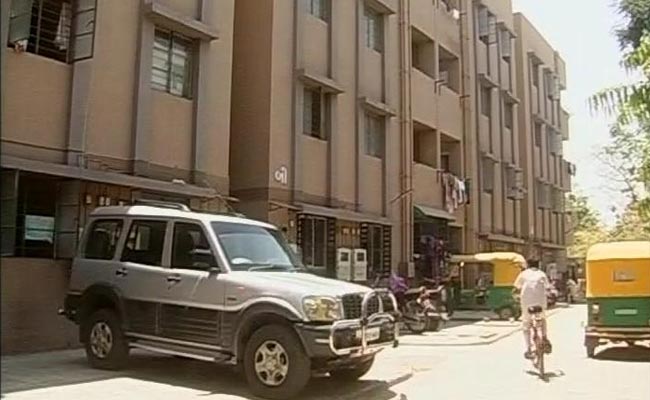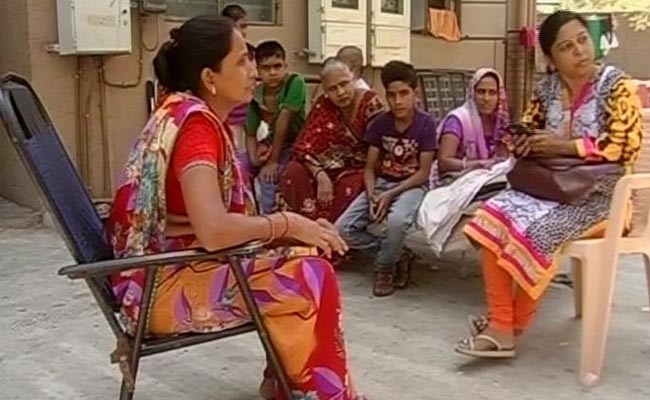The Shantideep Cooperative Housing Society took shape in Ahmedabad in 2014, replacing the Abuji ni Chapra slum.
Ahmedabad:
Domestic worker Geetaben Thakore, 46, is proud of her well-furnished one bedroom flat in the heart of Ahmedabad, a stone's throw from the luxurious bungalows she works in. It is not just a home - it marks the first step towards her dream of a slum-free city.
A few years ago, a slum sprawled where the four-storied building complex stands now. It was Geetaben who convinced her neighbours to accept alternative housing when Rajiv Awas Yojana - a government housing scheme named after former Prime Minister Rajiv Gandhi - was announced in 2010.
Under the Rajiv Awas Yojna, the Ahmedabad Municipal Corporation had set up a public-private partnership to build housing for the slum dwellers free of cost. In return, the corporation provided them with some benefits -- including unused government land for commercial and residential projects. 
The journey was not easy - Geetaben had to face suspicion and abuse from her neighbours, who were deeply uncomfortable with the idea of giving up their homes.
"They (the slum dwellers) alleged that I had taken money from builders and settled for a deal... but I was never bothered as I had done nothing wrong," Geetaben said.
But she reasoned with them, asking why there should be slums in a city at all. "If slums can be replaced by buildings such as this one, what's wrong? The families benefit. They get a lifestyle which is without any struggle and lack of amenities," she said.

In 2014, the Shantideep Cooperative Housing Society took shape.
Geetaben, by then, had found a mission. She and a group of women helped by the Mahila Housing Trust, an affiliate of the non-profit SEWA, bring about a silent revolution of replacing slums with housing projects with proper facilities.
"In 2010, six projects were taken up and after the scheme was amended in 2013, another six. In all, 6,500 families have availed of the benefits," said programme manager Bharati Bhonsale.
Geetaben says it is just the beginning -- only a dozen of the 60 slums located on government lands in the city have consented. But she said she hopes that "development without displacement will one day result in a slum-free city".
A few years ago, a slum sprawled where the four-storied building complex stands now. It was Geetaben who convinced her neighbours to accept alternative housing when Rajiv Awas Yojana - a government housing scheme named after former Prime Minister Rajiv Gandhi - was announced in 2010.
Under the Rajiv Awas Yojna, the Ahmedabad Municipal Corporation had set up a public-private partnership to build housing for the slum dwellers free of cost. In return, the corporation provided them with some benefits -- including unused government land for commercial and residential projects.

The buildings replacing the slum in Ahmedabad were built under the Rajiv Awas Yojana.
The journey was not easy - Geetaben had to face suspicion and abuse from her neighbours, who were deeply uncomfortable with the idea of giving up their homes.
"They (the slum dwellers) alleged that I had taken money from builders and settled for a deal... but I was never bothered as I had done nothing wrong," Geetaben said.
But she reasoned with them, asking why there should be slums in a city at all. "If slums can be replaced by buildings such as this one, what's wrong? The families benefit. They get a lifestyle which is without any struggle and lack of amenities," she said.

Geetaben and her group of women help convince slum dwellers to opt for alternative housing with proper facilities.
In 2014, the Shantideep Cooperative Housing Society took shape.
Geetaben, by then, had found a mission. She and a group of women helped by the Mahila Housing Trust, an affiliate of the non-profit SEWA, bring about a silent revolution of replacing slums with housing projects with proper facilities.
"In 2010, six projects were taken up and after the scheme was amended in 2013, another six. In all, 6,500 families have availed of the benefits," said programme manager Bharati Bhonsale.
Geetaben says it is just the beginning -- only a dozen of the 60 slums located on government lands in the city have consented. But she said she hopes that "development without displacement will one day result in a slum-free city".
Track Latest News Live on NDTV.com and get news updates from India and around the world

